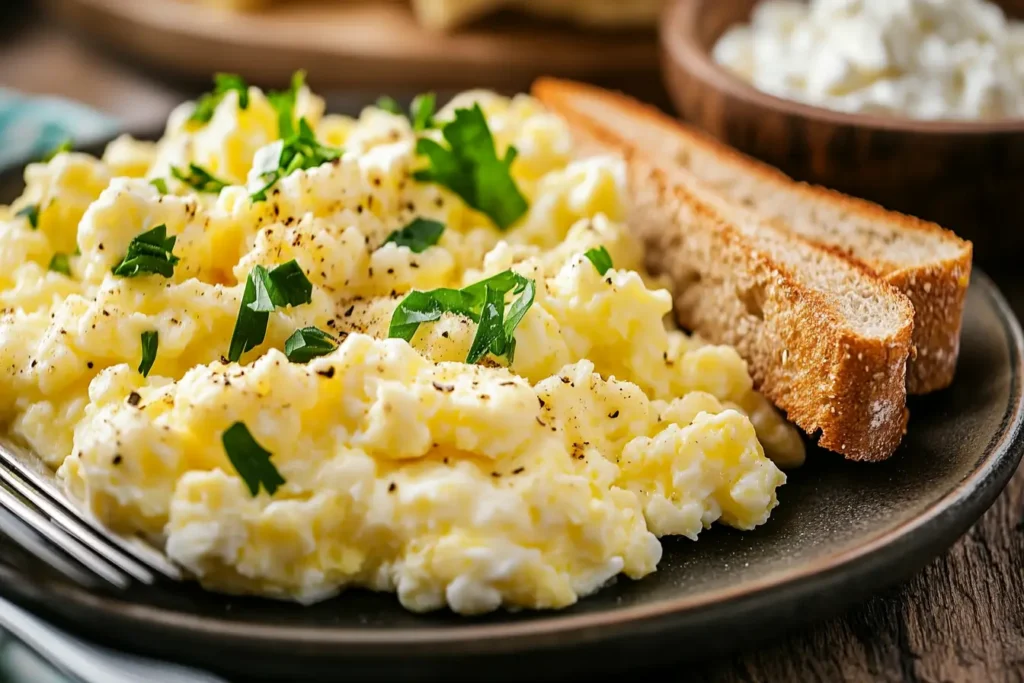Have you ever wondered, why put cottage cheese in eggs? It might sound unusual, but this simple trick can transform your breakfast into a creamy, protein-packed delight. By adding cottage cheese, you’ll get fluffier eggs, extra nutrition, and a richer taste—all without much effort!
Cottage cheese blends seamlessly with eggs, making them softer, creamier, and higher in protein. Whether you’re looking to upgrade your scrambled eggs, omelets, or baked casseroles, this combination is a game-changer. In this guide, we’ll explore:
- The science behind why cottage cheese works so well in eggs
- Health benefits, including protein, probiotics, and calcium
- The best ways to mix cottage cheese into eggs for perfect texture
- Easy, delicious recipes to try at home
By the end of this article, you’ll know exactly why putting cottage cheese in eggs is a must-try kitchen hack—and how to do it right. Let’s get started!
Table of Contents
Introduction to Cottage Cheese in Eggs
What This Article Covers
If you’ve ever wondered, “Why put cottage cheese in eggs?”, you’re not alone. This culinary trick has been gaining popularity, and for good reason. Whether you’re looking to improve texture, boost nutrition, or enhance flavor, cottage cheese might be the secret ingredient your eggs have been missing.
In this guide, we’ll cover:
- The science behind adding cottage cheese to eggs – Why does it work so well?
- Health benefits – How does it enhance protein content and nutrition?
- Best cooking methods – Scrambled, baked, or in an omelet?
- Delicious recipes – Easy ways to try this combo at home.
By the end, you’ll have all the reasons and inspiration you need to give this high-protein breakfast hack a try.
Why Cottage Cheese and Eggs Are a Trending Combination
Cottage cheese has long been a go-to ingredient for fitness enthusiasts, thanks to its high-protein, low-fat profile. But when combined with eggs, something magical happens!
Adding cottage cheese to eggs makes them:
- Extra fluffy – The moisture in cottage cheese helps prevent overcooked, rubbery eggs.
- Higher in protein – Cottage cheese packs a protein punch without adding excess fat.
- Creamier and richer – It gives eggs a velvety texture, almost like a gourmet dish.
Plus, it’s a fantastic way to sneak in extra calcium, probiotics, and essential amino acids into your breakfast without much effort.
Overview of Nutritional Benefits
Eggs are already a nutrient powerhouse, but pairing them with cottage cheese takes things up a notch. Here’s what you get from this combo:
- Protein boost – A mix of fast- and slow-digesting proteins keeps you full longer.
- Healthy fats – Supports brain function and energy levels.
- Calcium & probiotics – Good for digestion and bone health.
- Low-carb & keto-friendly – A perfect meal for weight management.
With so many benefits packed into one simple meal, it’s no wonder people are making this cottage cheese and egg breakfast a part of their daily routine!
The Science Behind Putting Cottage Cheese in Eggs

How Cottage Cheese Affects the Texture and Taste of Eggs
If you’ve ever struggled with dry, overcooked eggs, cottage cheese might be the secret ingredient you need. The moisture content in cottage cheese prevents eggs from drying out, keeping them soft, creamy, and fluffy.
But why does this happen? The answer lies in the structure of both ingredients. Cottage cheese contains casein protein, which helps retain water during cooking. When mixed with eggs, it creates a softer, more luxurious texture that you won’t get from plain eggs alone.
Taste-wise, cottage cheese adds a subtle tangy flavor that complements the richness of eggs. If you don’t like the texture of whole curds, blending the cottage cheese beforehand creates a smooth, velvety consistency.
The Nutritional Synergy: Protein, Healthy Fats, and More
Why put cottage cheese in eggs? One of the biggest reasons is the protein boost. Eggs are already high in protein, but adding cottage cheese supercharges your meal. Here’s how they stack up nutritionally:
| Nutrient | 2 Large Eggs | ½ Cup Cottage Cheese | Combined |
|---|---|---|---|
| Protein | 12g | 14g | 26g |
| Calories | 140 | 110 | 250 |
| Fat | 10g | 2g | 12g |
| Carbs | 1g | 3g | 4g |
Together, they create a high-protein, low-carb meal that supports muscle growth, satiety, and energy levels. Cottage cheese also provides calcium, probiotics, and B vitamins, making your breakfast even more nutritious.
Comparing Cottage Cheese to Other Dairy Additions
People often add dairy products like milk, heavy cream, or cheese to eggs for a richer texture. But how does cottage cheese compare?
- Milk & Cream – These add creaminess but lack the high protein content of cottage cheese.
- Shredded Cheese – Boosts flavor but is higher in fat and lacks probiotics.
- Cottage Cheese – Balances protein, creaminess, and nutrients without excess fat or calories.
For those looking for a healthier, protein-packed alternative, cottage cheese is the clear winner.
Health Benefits of Adding Cottage Cheese to Eggs
Boosting Protein Intake for Muscle Growth and Satiety
If you want a protein-packed breakfast, you can’t go wrong with eggs and cottage cheese. This combo provides a complete protein profile, meaning it contains all essential amino acids your body needs for muscle repair and energy.
Eating a high-protein breakfast has been shown to:
- Increase muscle synthesis – Ideal for athletes and fitness enthusiasts.
- Keep you full longer – Reduces mid-morning cravings and snacking.
- Support weight loss – High protein helps with appetite control.
Compared to other breakfast options like toast or cereal, eggs with cottage cheese offer a satisfying, nutrient-dense start to your day.
Improving the Creaminess and Moisture Content of Eggs
Many people struggle with dry, rubbery eggs, especially when scrambling them. Cottage cheese locks in moisture, preventing eggs from overcooking and making them soft, fluffy, and creamy.
This is especially useful for:
- Scrambled eggs – Prevents them from becoming tough.
- Omelets – Adds a rich, melt-in-your-mouth texture.
- Baked egg dishes – Helps retain moisture for a tender, airy consistency.
No more bland, dry eggs—just creamy, delicious bites every time.
Enhancing Nutrient Absorption with a Balanced Fat-to-Protein Ratio
Eggs contain fat-soluble vitamins like A, D, E, and K. To absorb these nutrients properly, your body needs a source of healthy fat—which cottage cheese provides.
This combination ensures that your body gets maximum nutrition from every bite. Plus, cottage cheese contains gut-friendly probiotics, which support digestion and immune health.
Why This Combo is Ideal for Low-Carb and Keto Diets
Looking for a keto-friendly breakfast? Why put cottage cheese in eggs? Because it’s a low-carb powerhouse!
- Eggs and cottage cheese are both naturally low in carbs.
- The high protein and fat content help maintain ketosis.
- It provides steady energy without blood sugar spikes.
This makes it a perfect meal for those on a ketogenic or low-carb diet.
How to Incorporate Cottage Cheese into Eggs
Adding cottage cheese to eggs is easier than you think! Whether you love scrambled eggs, omelets, or baked dishes, this protein-packed ingredient can elevate both flavor and texture. Here’s how to do it right.
Best Ways to Mix Cottage Cheese into Scrambled Eggs

Scrambled eggs are one of the easiest ways to incorporate cottage cheese. The trick is to mix it in before cooking to ensure even distribution and avoid clumps.
How to Make Perfect Cottage Cheese Scrambled Eggs:
- Whisk together 2 eggs and ¼ cup of cottage cheese in a bowl.
- Add a pinch of salt and pepper (or your favorite seasonings).
- Heat a non-stick pan over medium-low heat and add butter or oil.
- Pour the mixture into the pan and stir gently until soft and creamy.
- Serve immediately with fresh herbs or avocado on the side.
Pro Tip: If you don’t like curds in your eggs, blend the cottage cheese until smooth before mixing!
Tips for Making Cottage Cheese Omelets
Omelets are another great way to use cottage cheese. It adds moisture and a deliciously creamy filling that pairs well with veggies and protein.
Steps for a Fluffy Cottage Cheese Omelet:
- Beat 3 eggs with a splash of milk or water.
- Cook in a buttered pan until the edges start to set.
- Add ¼ cup of cottage cheese and other fillings like spinach, mushrooms, or ham.
- Fold the omelet and cook for another 30 seconds until warm.
- Serve with a sprinkle of black pepper and fresh parsley.
Not only is this omelet super satisfying, but it also delivers a powerful protein punch to keep you full for hours.
Using Cottage Cheese in Baked Egg Dishes (Quiches, Casseroles, and Frittatas)
For those who love make-ahead breakfasts, baked eggs with cottage cheese are a game-changer. The cottage cheese keeps the eggs moist and adds a subtle richness to every bite.
Cottage Cheese Egg Casserole
This easy meal-prep recipe is perfect for busy mornings!
- Preheat oven to 375°F (190°C) and grease a baking dish.
- Whisk together 6 eggs, ½ cup of cottage cheese, and ¼ cup of shredded cheese.
- Add diced vegetables (peppers, onions, spinach) and mix well.
- Pour into the dish and bake for 20–25 minutes until set.
- Allow it to cool for a few minutes before slicing and serving.
Low-carb
High-protein
Meal-prep friendly
For a quick grab-and-go version, bake the mixture in muffin tins instead!
For a delicious and protein-packed breakfast, try this Cottage Cheese Egg Bake recipe! It’s an easy make-ahead meal that’s perfect for busy mornings. Check out the full recipe here.
Cottage Cheese in Eggs—Best Recipes to Try

Now that you know how to use cottage cheese in eggs, here are some delicious recipes to try at home!
Fluffy Scrambled Eggs with Cottage Cheese
This recipe takes less than 10 minutes and guarantees soft, fluffy eggs every time.
Ingredients:
- 2 large eggs
- ¼ cup cottage cheese
- 1 tsp butter or olive oil
- Salt and pepper to taste
Instructions:
- Whisk eggs and cottage cheese together until smooth.
- Heat butter in a pan over medium-low heat.
- Pour in the egg mixture and cook slowly, stirring gently.
- Once the eggs are just set, remove from heat and serve.
Optional Add-Ins: Chopped chives, shredded cheese, or sautéed mushrooms.
High-Protein Cottage Cheese Omelet
This omelet is packed with protein and healthy fats, making it an ideal breakfast for weight loss or muscle gain.
Ingredients:
- 3 eggs
- ¼ cup cottage cheese
- ¼ cup diced bell peppers
- ¼ cup spinach
- 1 tbsp butter
Instructions:
- Whisk eggs and season with salt and pepper.
- Cook in a heated pan until the edges start to set.
- Add cottage cheese, bell peppers, and spinach.
- Fold the omelet and cook until heated through.
Serve with avocado for an extra nutrient boost!
Baked Eggs with Cottage Cheese for Meal Prep
Perfect for busy mornings, this baked dish is easy to make ahead and packed with nutrients.
Ingredients:
- 6 large eggs
- ½ cup cottage cheese
- ½ cup diced tomatoes
- ¼ cup shredded cheese
- 1 tsp Italian seasoning
Instructions:
- Preheat oven to 375°F (190°C).
- Whisk eggs, cottage cheese, and seasonings together.
- Pour into a greased baking dish and top with tomatoes and cheese.
- Bake for 20–25 minutes or until set.
Meal-Prep Tip: Store in the fridge for up to 4 days or freeze for later.
Common Questions About Cottage Cheese in Eggs
Mixing cottage cheese with eggs might sound unusual, but it’s a simple hack that improves texture, boosts nutrition, and enhances flavor. If you’re still unsure about trying this combo, here are answers to some common questions people ask.
Why put cottage cheese in eggs?
The biggest reason to add cottage cheese to eggs is to improve texture and nutrition. Cottage cheese makes eggs:
- Fluffier and creamier – No more dry, rubbery scrambled eggs!
- Higher in protein – A powerful boost for muscle growth and satiety.
- More nutritious – Packed with calcium, probiotics, and B vitamins.
It’s also an easy way to switch up your breakfast routine without adding extra prep time.
Does cottage cheese melt when you bake it?
Not exactly. Unlike traditional cheese, cottage cheese doesn’t fully melt when heated. Instead, it softens and blends into dishes, creating a creamy, slightly tangy texture.
In scrambled eggs and omelets, it mixes smoothly, making them moist and fluffy. In baked egg dishes like quiches or casseroles, it adds richness without greasiness.
What does cottage cheese do in baking?
Cottage cheese is a secret weapon in baking! It helps:
- Keep baked goods moist – Perfect for quiches, frittatas, and breakfast casseroles.
- Boost protein – A great way to add nutrition to muffins, pancakes, or egg bakes.
- Enhance flavor – Its mild tanginess complements both sweet and savory recipes.
If you’re baking a high-protein breakfast, replacing some milk or cream with cottage cheese can make it even better.
What is the cottage cheese baking hack?
The cottage cheese baking hack is blending it until smooth before adding it to recipes. This removes curds, making it creamier and more versatile.
Try blending cottage cheese and using it:
- As a base for creamy sauces or dips.
- As a substitute for ricotta or sour cream in recipes.
- To enhance eggs, pancakes, or baked goods with extra protein and moisture.
If you haven’t tried it yet, this simple trick can change the way you cook!
Conclusion
Recap of Benefits and Key Takeaways
So, why put cottage cheese in eggs? The answer is clear—it makes eggs fluffier, healthier, and more delicious! Whether you’re looking for a high-protein breakfast, a creamier texture, or an easy meal-prep idea, this combination delivers big benefits.
Here’s a quick recap of why this combo is worth trying:
- Better texture – No more dry, overcooked eggs!
- Higher protein – Ideal for muscle growth and satiety.
- Nutrient-rich – Packed with calcium, probiotics, and essential vitamins.
- Keto & low-carb friendly – Perfect for healthy eating.
- Easy to cook – Works in scrambled eggs, omelets, and baked dishes.
Give It a Try!
If you’ve never added cottage cheese to your eggs, now’s the time to experiment! Start with a simple scrambled egg recipe, or try a baked casserole for meal prep.
Want more delicious breakfast ideas? Check out our other high-protein recipes for inspiration!
Dernière mise à jour : 10 February 2025

